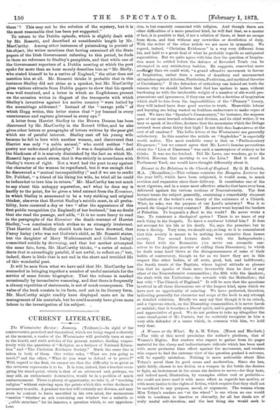Dissent in Its Relations to the Church of England. By
G. H. Cartels, M.A. (Macmillan.)—This volume contains the Bampton Lectures for the year 1871, which have been subjected, it would seem, to much revision and expansion since their delivery. It constitutes one of the most vigorous, and in a sense most effective attacks that have ever been delivered against the various sections of Nonconformity. The first lecture treats the subject generally, containing a remarkably eloquent vindication of the writer's own theory of the existence of a Church. What, he asks, was the purpose of our Lord's ministry? Was it to preach the Gospel to every creature ? He never went beyond the borders of Palestine. To bequeath a Book to the world ? He never wrote a line. To construct a theological system ? There is no trace of any such thing in the Gospels. To leave a sentiment behind him ? It does not account for his life or his death. No, says the preacher, but to form a Society. Very true, we should say, as long as it is remembered that this society is meant to be nothing less extensive than human society. The second lecture deals with the Independents ; the third with the Romanists (we never can reconcile our- selves to the Anglican practice of calling them Dissenters), in which he deals some hard blows at the disingenuousness of some of their habits of controversy, though as far as we know they are in this respect like other bodies, of all sorts, good, bad, and indifferent ; the fourth treats of the Baptists, whose logical attitude so pleases him that he speaks of them more favourably than he does of any other of the Nonconformist communities; the fifth with the Quakers; the sixth with the Unitarians ; the seventh with the Methodists ; the last with "The Church of England." It will be seen that the questions involved in all these discussions are of the largest kind, upon which we have now no opportunity of entering. We have preferred, therefore, indicating generally the character and scope of the book to any attempt at detailed criticism. Briefly we may say that though it is an attack, and a vigorous attack, on the Dissenting communities, it is never harsh or unkind ; that it breathes a liberal spirit, and is generally sympathetic and appreciative of good. We do not profess to take up altogether the same stand-point of Mr. Carteis, but we certainly recognise in him a very able defender of a cause which, in common with him, we hold very dear.






































 Previous page
Previous page